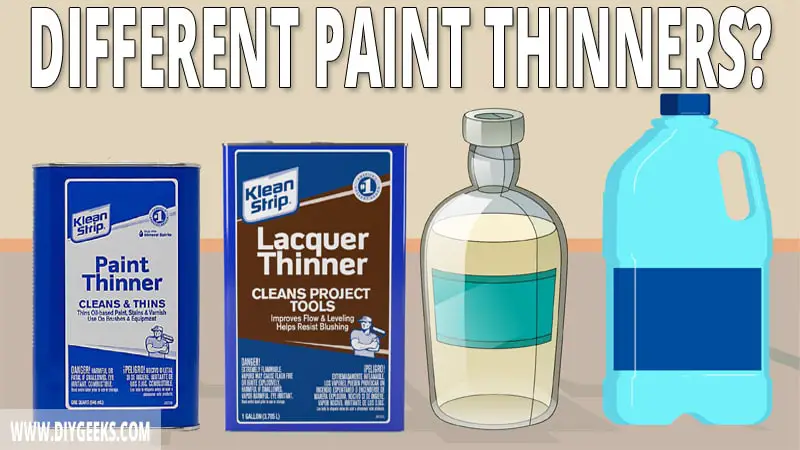Paint thinners are solvent types used to reduce the viscosity or thickness of water-based and oil-based paints, sealers, or wood stains.
Different paint thinner types include lacquer thinner, mineral spirits, water, denatured alcohol, naphtha, and xylene.
You should use paint thinner to reduce the paint viscosity, get a smoother finish, clean painting tools, and remove small paint stains.
Different Paint Thinner Types
Different paint thinner types are listed below.
- Lacquer Thinner.
- Mineral Spirits.
- Water.
- Denatured Alcohol.
- Naphtha.
- Xylene.
Lacquer Thinner
Lacquer thinner is a solvent that thins lacquer-based paints and finishes but can also thin and remove other paint types. Its primary purpose is to reduce the lacquer paint viscosity and make it easier to apply.
You can use lacquer thinner to clean painting equipment, such as sprayers or brushes, prepare (or clean) the surface before applying paint, and remove different paint types from surfaces.
Mineral Spirits
Mineral spirits (or white spirits) are petroleum-based solvent used to thin oil-based paints, sealers, and stains. It’s one of the easiest paint thinner products that thin paints with ease.
You can use mineral spirits to clean paint equipment or remove small paint stains from surfaces.
You can’t use mineral spirits to thin water-based paints as they aren’t compatible.
Water
You can use water to thin water-based paints and sealers. Since water-based paints (or sealers) use water as their main solvent, adding more water before application increases the solvent ratio and makes the paint viscosity thinner.
Denatured Alcohol
Denatured alcohol is a solvent type used to thin water-based paints and shellac sealers. A small denatured alcohol can thin water-based paints, making them easier to apply.
You can use denatured alcohol to remove water-based paints, clean the surface before painting, and clean oil-based paint without removing them.
You can’t use denatured alcohol to thin oil-based paints or sealers.
Naphtha
Naphtha is a solvent type used to thin oil-based paints and sealers before application. You can use Naphtha to prepare a surface before paint application and to clean painting equipment.
Naphtha has a fast drying time, making it more suitable when working with coatings that need a fast drying time.
While there are naphtha thinners, the solvent is also included in the formula of other thinners, such as lacquer thinner.
Note: You should only use it if you are experienced with thinning compounds and always put on protective gear before using it.
Xylene
Xynele is a solvent type used to thin oil-based paints and sealers, amongst other purposes. You can use Xylene thinner to clean painting equipment and remove graffiti from several surfaces.
Xylene is a strong solvent and must be used by experienced painters only.
Related Read: Mineral Spirits vs Paint Thinner?
What Is The Strongest Paint Thinner?
The strongest paint thinner for oil-based paints or sealers is lacquer thinner, while the stronger thinner for water-based paints or sealers is water.
Lacquer thinner is a strong thinner as it’s made from several solvents that can dilute strong sealers, such as lacquer or varnish. Sealers are the hardest finishes to dilute as they are made from thick and strong additives and oils.
However, lacquer thinner isn’t always the strongest paint thinner. For instance, while thinning water-based paint, lacquer thinner is useless as it can’t dilute it. Water is the stronger thinner for water-based paints.
Why Should You Use Paint Thinners
You should use paint thinners for the following things.
- Viscosity: Use paint thinner to reduce (or thin) the paint or sealer viscosity and make them easier to apply. Most paints or sealers have a thick viscosity that is hard to apply or spray.
- Cleaning: Use paint thinner to clean painting tools.
- Smooth Finish: Use paint thinners to reduce the paint viscosity and get a smoother finish. It’s harder to get a smooth finish if the paint has a thick viscosity.
- Remove Small Paint Stains: Use paint thinner to remove small paint stains from surfaces while painting.
How To Choose a Paint Thinner?
While choosing a paint thinner consider the following tips.
The Base or Formula
When choosing a paint thinner, check its base or formula to see if it’s compatible with the paint type you want to thin. For instance, use paint thinner made from water (or just water) when thinning water-based paints.
Use paint thinner made from resins, oils, or petroleum distillation when thinning oil-based paints.
If you use the wrong paint thinner type you will ruin the paint coating.
The Evaporation Rate
Thinners tend to evaporate quickly due to their chemical formula. For instance, thinners gotten from alcohol tend to air dry super fast. This can make it difficult for the paint to dry properly. If the thinning compound evaporates too quickly, the coating will not dry evenly.
So always go for a thinner that doesn’t dry too fast.
FAQ’s
Can You Thin Paint Too Much?
You can thin a paint too much, creating an over-thinned coating that creates a crack and weak finish. If you apply an over-thinned paint, its finish will crack, peel off, or have a lighter color shade.
What Happens if You Use The Wrong Paint Thinner Type?
If you use the wrong paint thinner type you will ruin the paint coating. For instance, if you use water to thin oil-based paint, the finish will become blurry and won’t adhere properly.
Can You Apply Paint Without Thinning It?
You can apply paint without thinning if you need thick coatings. Thick coatings offer better protection and durability, but they take longer to dry.
[sc name=”types-of-paint-thinners”][/sc]


